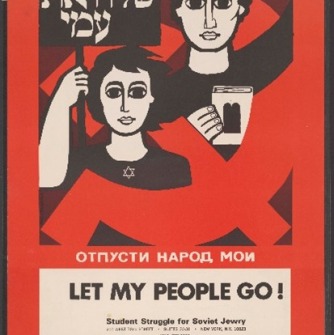| Contact |
Center for Holocaust and Genocide Studies
|
|---|
For decades, Jews in the former Soviet Union experienced severe restrictions on their cultural and religious identities and widespread antisemitism. Following the 1967 Arab-Israeli War, thousands sought to immigrate to Israel only to have their requests repeatedly denied. Facing international pressure, the Soviet Union began allowing small numbers of Russian-speaking Jews to emigrate in the 1970s. While most went to Israel, some came to the United States and settled in such Massachusetts communities as Brighton and Lynn. After a prolonged human rights campaign and the collapse of the Soviet Union, tens of thousands of Jewish refugees followed in their footsteps. Their arrival marked the beginnings of a thriving community in Massachusetts.
Although the Soviet government allowed some Jews to emigrate during the Cold War, many more were denied the right to leave. Known as refuseniks, they faced government intimidation, years of separation from loved ones and even arrest and imprisonment. In 1970, a small group of refuseniks attempted to draw the world’s attention to the plight of Soviet Jews by “hijacking” a Soviet plane and flying it out of the country. The group’s subsequent trial in Leningrad and the long prison sentences its members received sparked a human rights campaign in the West. Here in Massachusetts, activists petitioned American and Soviet officials, organized boycotts and held rallies that brought the issue to the attention of US representatives who, in turn, made freedom of movement a condition of any bilateral trade agreement with the Soviet Union.
A new Center for Holocaust and Genocide Studies project seeks to trace this history and highlight its links to the North Shore and the local Russian-speaking community through a traveling exhibit and oral interviews with local Russian-speaking Jews.
So far, we have recorded recollections of Stalinist oppression and KGB surveillance, of loved ones unjustly persecuted and sentenced to the gulag and of young men and women who were denied access to higher education and employment because of their Jewish ethnicity. Alongside harrowing stories of persecution, we have also recorded recollections of happy childhoods and lifelong friendships that belied the everyday antisemitism that permeated Soviet society. While many sought to emigrate because of antisemitism or simply to be able to “live in truth,” as the renowned Czech playwright Václav Havel once said, others sought to build better lives in the West.
Stay tuned for more information about the traveling exhibit, which is scheduled to open in the spring of 2023. Find more information or share your story, or email Dr. Regina Kazyulina.
Major funds for this project were provided by Combined Jewish Philanthropies (CJP), with additional support from Mass Humanities. We are deeply thankful to the two funders for helping us shine light on this community.

